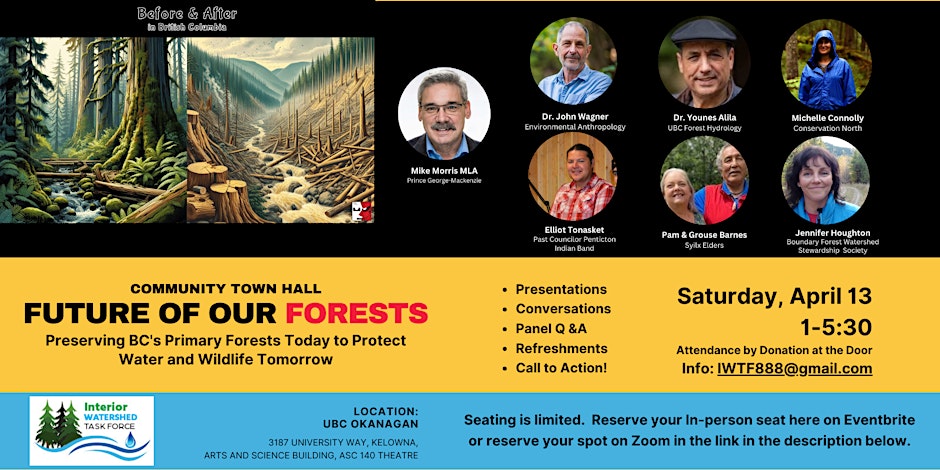Thank you for your participation in our first Town Hall at UBC-Okanagan that took place in April 2024.
Let’s keep the momentum going!
We’ve honed in on three actions you can take to help us further our cause.
- Watch the Future of Our Forests event videos and share them with friends and family.
- Join the IWTF. There are many ways! Join us on Facebook, add yourself to our email list, or join one of the coalition groups closest to you.
- Write to your MLA and local media about the Three Zone System for Interior BC (described below).
Three Zone System for Interior BC
If we want healthy communities and nature in a changing climate, we need to allocate land to the maintenance of healthy ecosystems.
Click here for the Seeing Red map. The Seeing Red map provides a visual reference for understanding the three-zone system being proposed by several advocacy groups.
Zone 1: Industrial forestry
- A zone for extraction.
- Previously logged lands, also called secondary forests. Red in the Seeing Red map.
- Where there is room for improvement in forest practices, such as no glyphosate and no clearcutting.
- Will likely be short-rotation, structurally simple plantation-like forests.
- Will require expertise in forestry and silviculture.
Zone 2: Restoration
- A zone to restore watersheds for clean water, improvements in wildlife habitat and many other values.
- Previously logged lands, also called secondary forests. Red in the Seeing Red map.
- Where there is a long-term commitment to recruiting some of the structural elements and complexity found in primary (natural) forests.
- Will require a long-term commitment to let the ecosystem heal.
- Where there is a riparian zone that was damaged by logging and to provide connectivity.
- Where we can enable wildlife movement corridors for gene flow, migration, and connectivity between ‘islands’ of primary forest left in the industrially logged landscape so that wildlife can have cover as they move between the best habitats.
- Will require expertise in Traditional Ecological Knowledge, ecology, biology and natural history and forestry.
- Where there is a consumptive watershed with cumulative downstream risks.
Zone 3: Primary (natural) forest
- A zone to protect never-logged forests for habitat and adaptation to climate change. Green in the Seeing Red map.
- These are the last healthy ecosystems and the places we need to leave alone. Keeping them healthy means not logging them.
- No salvage logging in this zone. When primary forests have fire, beetles and defoliator outbreaks, we leave them alone and let them recover naturally.
- Full protection at two scales:
Scale 1. Conserve the fragments + shards of primary forest. Restore the areas around them.
Scale 2. Conserve the large, intact forests; include the remaining never-logged watersheds that have no developed roads.
More action items
- Listen to advice from community groups if you want to launch your own. Conservation North will provide one-on-one training for anyone interested in establishing their own community group. Email them if you are interested.
- Subscribe to journalist Dave Broadlands’s Evergreen Alliance website for current news about forests in BC.
- Watch this short video from the Boundary Forest Watershed Stewardship Society (BFWSS), which has launched the first BC wide citizen’s campaign to change provincial forestry legislation.
- Follow MLA Mike Morris on Facebook.
- Join the BC Forestry Reform Facebook group.
- Sign up for this upcoming event in Kelowna in June 2024, Wildfire Coexistence in BC: Solutions Symposium | (ubc.ca)
- Copper Sky Productions supported our Town Hall. See their work here.
- Connect with local elders, Indigenous and settler, who spend time on the land for inspiration and knowledge about what matters on the land.
The Interior Watershed Task Force is a coalition of more than twenty community and professional groups. We launched in 2023. The IWTF advocates for the protection and preservation of water, primary (natural) forests, and wildlife habitat in Interior BC. We are based in the Okanagan and respectfully live and work on ancestral territories of several First Nations.
Join us to send a unified message to the BC government!
Watch out for future events sponsored by the IWTF!

Leave a Reply